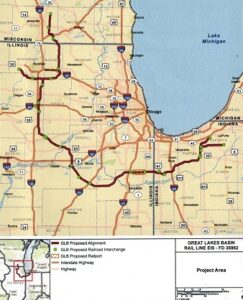Surface Transportation Board holds scoping meeting on Great Lakes Basin Rail Line
By Kathryn Menue
Editor
BELVIDERE – On Tuesday, April 19, hundreds of people filed into the Community Building Complex of Boone County at 10 a.m. to participate in the scoping meeting for the Great Lakes Basin’s proposed rail line that could run through Boone County.
From 10 a.m. to 10:30 a.m., Boone County residents and attendees from neighboring counties roamed the Community Building looking at map projections of where the rail line would lie and what actions the federal agency: the Surface Transportation Board will take before letting Great Lakes Basin begin work on a new rail line.
From 10:30 a.m. to 11 a.m., Dave Navecky, of the Service Transportation Board Office of Environmental Analysis, led a presentation on the future plans of the proposed railway.
According to Navecky, the Service Transportation Board along with the ICF International agency, will investigate all of the issues concerned with the new rail line and what impacts that would have on the communities.
The plan for the rail line is a four-step plan that will likely last for the next two to three years.
Currently, the review process is in the beginning stages. This step focuses on compiling public comments from all of the areas that will be affected by the new rail line. From these comments, the Surface Transportation Board will identify valid concerns to be analyzed.
“That’s why we’re here today is to hear from you,” Navecky said.
Public comment is open until June 15. If anyone would like to make a comment about the proposed rail line, they can go online to www.stb.dot.gov and click on “E-FILING” and select Environmental Comments or call (202) 245-0350.
Navecky said that all of the incoming and outgoing correspondence will be transcribed on the website to “ensure transparency.”
“We’ll take all that information that we get from you and compile it into our scoping study,” Navecky said.
From there, the Surface Transportation Board will study, research, and analyze the issues brought up from step-one and will prepare and issue a draft of an Environmental Impact Statement.
This will focus on topics such as noise and vibrations, transportation/traffic delays, safety, land use, recreation, biological resources, water resources, navigation, geology and soils, air quality and climate change, energy resources, socioeconomics, cultural and historical resources, visual resources, and environmental justice.
The third step will be to distribute the draft and collect commentary on any issues the board may have missed in their study. In this step, the Surface Transportation Board will return to Boone County for an update on the rail line.
“We will look for public comments on something we missed or data we overlooked,” Navecky said. “We will be back out for another series of meetings much like this one, and I promise, there will be on in Belvidere.”
Once the secondary round of meetings is complete, the Surface Transportation Board will issue a finalized Environmental Impact Statement where the board will decide how to proceed with the rail line. This will include them accepting the rail line proposition as is, denying it, or accepting it with conditions.
Although Navecky said the board will analyze the situation of the rail line closely, residents of Boone County still voiced their concerns over the possible issues that may arise with a new railway system.
Several of the people who commented on the proposed railroad were advocating that the board take into consideration their environmental concerns.
Toria Funderburg, whose husband’s family has farmed in Boone County for 150 years, asked that the board take into consideration that by building the railroad, they would be taking away viable farming land with exceptional soil.
“We ask that the Surface Transportation Board consider our natural resources,” Funderburg said.
Dan Kane and Joshua Sage of the Boone County Conservation District also voiced their concerns on the environmental issues.
They do not want to see an “impairment” of the “natural environment and natural resources” to preserve the natural beauty of Boone County. They don’t want a new railroad system to undo all of the preservation work they’ve done.
Richard Beuth and Julie Newhouse of the Winnebago-Boone Farm Bureau have “been concerned about the GLB Railroad since” they heard about it last year.
“Over 1,000 acres of farmland will be lost if this plan goes into place,” Beuth said. “I encourage every Winnebago and Boone County farmer to submit a comment.”
Newhouse added her concerns as well.
“A poorly placed railroad could rid Winnebago and Boone County of valuable farmland,” Newhouse said. “It should not be approved at all for a short economic gain.”
Other farmers, such as John Cleland, Paul Donley, Ron Nelson, and Scott Fowler, are worried about losing their land, losing valuable time of moving equipment around rail lines, and losing viable resources from possible toxic run-off that would contaminate fields and aquifers.
Others are concerned for the safety of school children. As of now, the rail line is proposed to run by Capron Elementary School.
Tom Hribik, a school bus driver for North Boone School District, said he is scared for the children who might have to cross the railroad.
Some attendees showed their frustration with the rail line situation and handed out pamphlets and stickers opposing the railroad.
“It is not acceptable,” Sandra Kennedy, of Leroy Grange and the Boy Scouts of America, said. “We must formulate a strong force to go against this.”
Richard Pierce, a Boone County farmer, and Sherry Giesecke, a Boone County Board District I member, asked that the board use an alternative route bypassing valuable farmland and using pre-existing rail lines.
The Surface Transportation Board will take these comments under consideration and said that if anyone has any questions concerning the railroad to go online to www.greatlakesbasinraileis.com.




